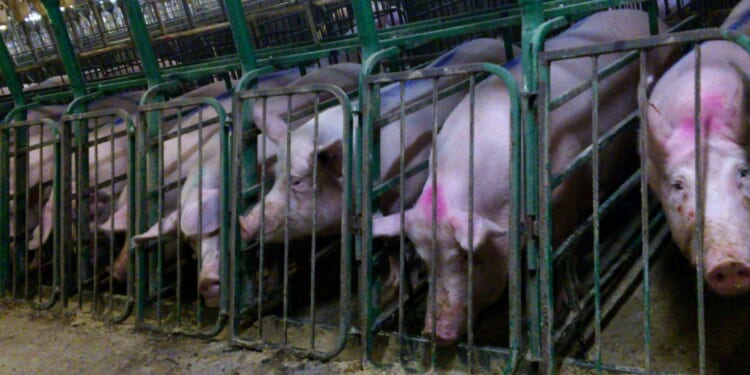Chris Platt, is Co-Founder of the Conservative Animal Welfare Foundation.
After the Second World War, Britain faced a desperate food crisis. Rationing persisted until 1954, imports were unreliable, and rebuilding domestic production became a national mission. The government responded with subsidies, mechanisation, and the promotion of intensive farming methods. These policies worked: yields rose, food became more affordable, and hunger receded.
Factory farming began as a survival strategy. But what was once essential to deliver food security has morphed into something very different: a system dominated by global agribusiness, where efficiency and scale override welfare, sustainability, and resilience. Smaller farmers — once the backbone of rural Britain — are squeezed out, while multinational corporations consolidate land and influence.
The external costs are obvious: polluted rivers, degraded soils, biodiversity loss, dependence on imported feed, and exposure to climate and market shocks. Instead of strengthening Britain’s resilience, factory farming has left us vulnerable to disruption.
Concerns about animal welfare entered the picture as early as 1965. Following Ruth Harrison’s Animal Machines, the Brambell Committee concluded that animals should be free to turn around, groom themselves, get up, lie down, and stretch their limbs. This became the foundation of the now-famous Five Freedoms: freedom from hunger and thirst; from discomfort; from pain, injury or disease; to express normal behaviour; and from fear and distress. These principles remain the cornerstone of welfare thinking — yet many intensive systems still fall far short of them.
Investigations continue to expose grim realities. Earlier this year, Tesco, Asda, and Morrisons cut ties with a supplier after undercover footage showed piglets being beaten to death. These are not isolated incidents but the unacceptable by-products of a model built on maximising output at minimal cost.
Even judged on food security, the model is failing. Industry boasts of Britain’s self-sufficiency often ignore the vast imports of animal feed. Once imported soya is factored in, the UK is only 41 per cent self-sufficient in pork and 54 per cent in chicken. Across all meat, self-sufficiency stands at just 57 per cent . Much of what is marketed as “home-produced” is reliant on feed grown and shipped from abroad, often linked to deforestation.
That dependence carries enormous risk. With wars in Europe and the Middle East, heightened geopolitical tension, and climate extremes, global supply chains are more fragile than ever. A blockade, drought, or political rupture could compromise feed imports — and with them, a large portion of our domestic livestock production. To call this “food security” is misleading at best.
The contradiction between public expectations and industry practice could not be sharper. Research in CAWF’s report Farm Animal Welfare in the UK: What Does the British Public Want? shows overwhelming support for higher welfare standards. Yet around 85 per cent of meat produced in the UK comes from industrial farming systems that confine animals in ways that deny them the most basic freedoms. The British people are promised high standards, but the reality is too often hidden behind closed doors.
We must return to the spirit of the post-war mission — food security for the British people — but redefine it for today. True security is not measured only by output. It is about resilience, sustainability, and public trust. It means food produced to high standards, by farmers who are supported rather than undercut, and in ways that protect the land for future generations.
A modern Conservative vision for farming should:
- Rebalance subsidies to reward higher welfare systems, environmental stewardship, and horticulture. Public money should deliver public goods, not scale alone.
- Invest in regenerative and mixed farming that restores soils, cuts pollution, and reduces dependency on imported feed.
- Support protein diversification, from pulses and hybrid products to alternative proteins, lowering reliance on volatile global markets.
- Strengthen local supply chains, creating processing and distribution hubs to support rural communities and reduce emissions.
- Promote innovative, data-driven farming, using technology to raise crop yields while cutting fertiliser and pesticide use.
Public opinion strongly favours such change. Polling shows broad support for higher animal welfare standards, stronger environmental protections, and reduced reliance on imports produced to lower standards. Younger voters in particular — including 16- and 17-year-olds soon able to vote — expect leadership on climate, food, and fairness.
A Conservative Party that champions a reformed model of farming will speak directly to their priorities while strengthening Britain’s long-term resilience.
Just as the post-war government acted with urgency and vision, so too must we today. We cannot continue with a model that undermines smaller farmers, exploits animals and leaves our food security exposed to volatile global markets.
The world has changed, and strategies born in the 1940s are no longer fit for purpose in the 2020s. This is our opportunity to move beyond factory farming and build a system that meets today’s needs: resilient, sustainable, and fair. By supporting all farmers to adopt higher welfare and more sustainable approaches, Britain can secure true food security, protect our countryside, and lead the world in farming that is competitive, resilient, and strong.









![Keith Ellison Caught Promising to Fight State Agencies for Somali Fraudsters [WATCH]](https://www.right2024.com/wp-content/uploads/2026/01/Keith-Ellison-Caught-Promising-to-Fight-State-Agencies-for-Somali-350x250.jpg)

![Florida Officer Shot Twice in the Face During Service Call; Suspect Killed [WATCH]](https://www.right2024.com/wp-content/uploads/2025/12/Inmate-Escapes-Atlanta-Hospital-After-Suicide-Attempt-Steals-SUV-Handgun-350x250.jpg)





